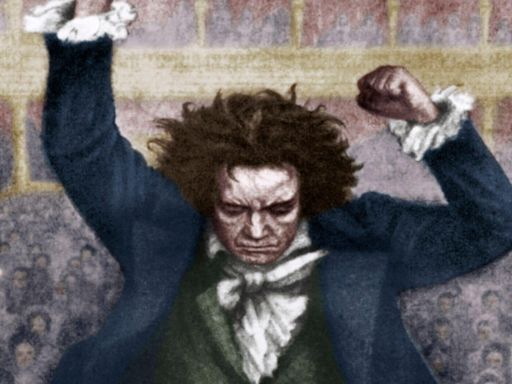Search results
People also ask
What symphonies did Beethoven write?
Is Beethoven's 9th Symphony a choral symphony?
Which Beethoven symphony has a choir?
When did Ludwig van Beethoven complete his Ninth Symphony?
The Symphony No. 9 in D minor, Op. 125, is a choral symphony, the final complete symphony by Ludwig van Beethoven, composed between 1822 and 1824. It was first performed in Vienna on 7 May 1824.
- 1822–1824
- Four
- German
May 2, 2024 · By the time Beethoven’s Symphony No. 9, with its huge ‘Ode to Joy’ climax, was premiered on 7 May 1824, the composer was profoundly deaf. Ludwig van Beethoven’s revolutionary Ninth Symphony is, without question, one of the greatest works in classical repertoire.
4 days ago · Symphony No. 9 in D Minor, Op. 125, orchestral work in four movements by Ludwig van Beethoven, remarkable in its day not only for its grandness of scale but especially for its final movement, which includes a full chorus and vocal soloists who sing a setting of Friedrich Schiller ’s poem “An die Freude” (“ Ode to Joy”).
- Betsy Schwarm
- Chicago Tribune
Illinois Philharmonic Orchestra performs Symphony No. 9 nearly 200 years to the day of its debut
The first performance of Ludwig van Beethoven’s Symphony No. 9 on May 7, 1824, in Vienna, will be celebrated during a 200th anniversary performance by Illinois Philharmonic Orchestra. Joyful ...
2 days ago
- The Telegraph via Yahoo
John Suchet: The chaotic genesis of Beethoven’s greatest hit
Few themes in classical music are more famous than the “Ode to Joy” setting in the final movement of Beethoven’s Symphony No 9, the Choral. Its universal message of brotherhood – “All Mankind ...
4 days ago
- Haydn—Beethoven’s mentor—thought the younger composer had a bit of an attitude, notoriously referring to his student as “the grand mogul” or “big shot.”
- The Haydn–Mozart–Beethoven connection climaxes in the Symphony No. 2. While the early masters codified the four-movement Classical symphony, Beethoven expanded their visions in this work.
- “Eroica” Beethoven admired Napoleon and dedicated his Symphony No. 3 to the French general. However, he furiously withdrew his dedication when Napoleon declared himself emperor, violently scratching Napoleon’s name from the dedication page with such vigor that he tore through the paper.
- Explore the nine symphonies and you’ll hear that the odd-numbered works are tempestuous while the even-numbered ones are more sedate. Consider Symphony No. 4.
21 images. See the full gallery: Beethoven: Compositions, biography, siblings and more facts. He reinvented the symphony, reshaped string quartets, and redefined piano sonatas. But from his siblings to how he went deaf, there's much more to learn about Ludwig van Beethoven, the man who changed music forever.
Ludwig van Beethoven (1770-1827): Symphony No. 9 in D Minor, Op. 125. by Michael Steinberg. Few musicians would assert that the Ninth is the greatest of all symphonies, that it is the summit of Beethoven’s achievement, perhaps not even that it is his finest symphony or, in any altogether personal way, their own favorite.

